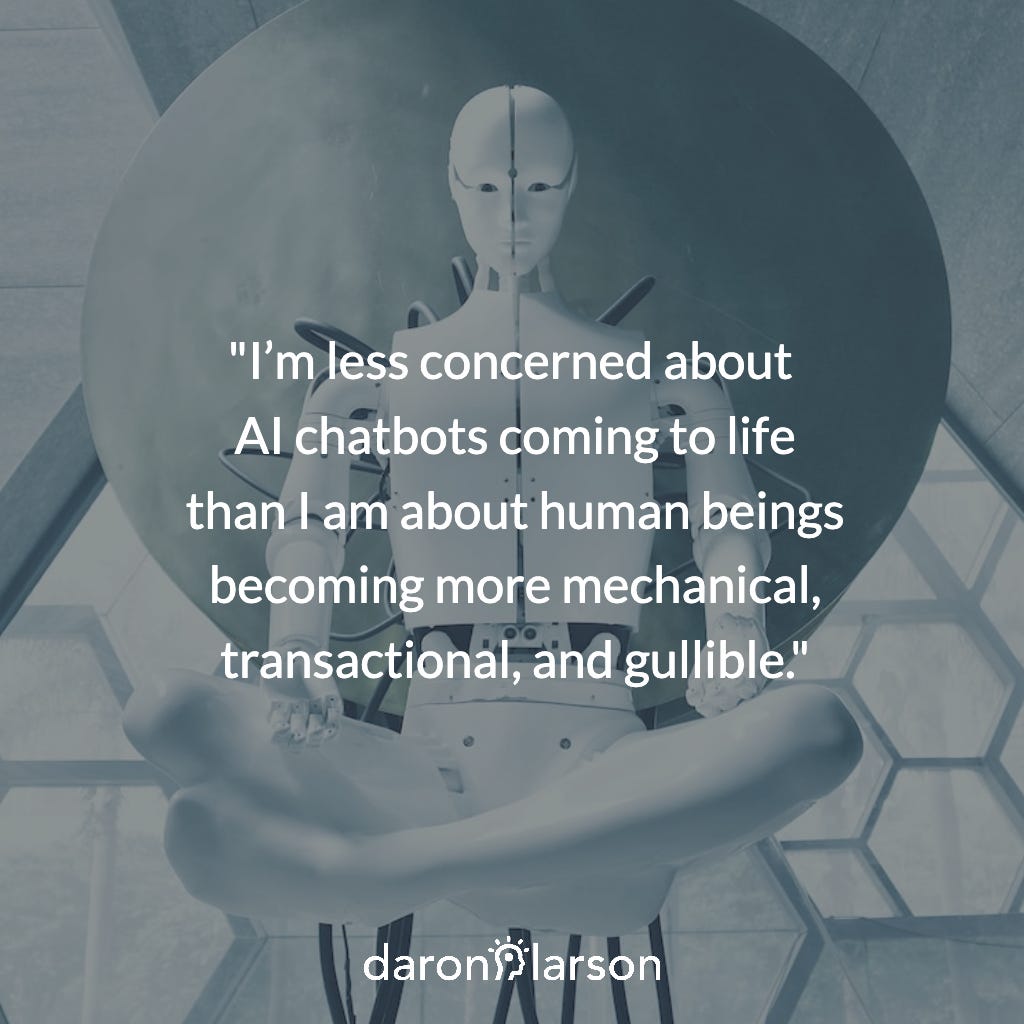Humans love to imagine machines coming to life and destroying us.
Artificial intelligence chatbots can process unimaginably huge amounts of data instantly, but they are still exciting, terrifying tools in a sophisticated imitation game.
Mimicking the human ability to read and write dazzles us, but it’s not the same as being alive.
Sentience is the capacity to experience feelings and sensations consciously. It requires processing signals from outside the body (through our senses) and inside the body (through interoception).
AI chatbots don’t have bodies, so I’m less concerned about them coming to life than I am about human beings becoming more mechanical, transactional, and gullible.
I fear taking the natural marvel of human consciousness for granted, neglecting its cultivation, and being fooled by its likeness.
While billions of dollars are invested in making it more difficult to detect the absence of humans behind the words we read, here are four ways to hold onto your sentience, feel more alive, and protect your conscience.
Become a connoisseur of sensations
A chatbot can excel at writing advertisements, coding, and reviewing medical records.
However, it will never be able to appreciate a sunset, experience the taste of chocolate, or have vivid memories triggered by the scent of honeysuckle.
While it may analyze musical data mathematically, it will never actually feel the emotions it evokes.
Habitually directing your attention to sensory details sharpens your perceptions to uncover the richness hidden in everyday moments.
Develop emotional granularity
We make sense of our lives through the stories we tell each other and ourselves, and we think about our feelings more often than we feel them. This eventually results in oversimplifying our complex emotional experiences to make them fit neatly into familiar narrative structures.
Investigate the sensations and perceptions that reveal your energy level and mood a few times a day—even if you have to guess a lot.
Instead of trying to 'solve' unpleasant feelings, work on gradually being able to detect them with greater precision and less internal interference.
Get better at living with uncertainty
Humans have an aversion to discomfort and uncertainty. Chatbots can spot clues that reveal our social and emotional unease, but they’ll never be able to know corporeally what it feels like to yearn for an unknowable answer.
On the other hand, we can choose several opportunities a day to observe our need for certainty. We can draw from what we know from direct experience about what it's like to refrain from scratching an itch or acclimate to cold water.
A host of physical and emotional sensations build to a peak and subside when we practice letting them play out sometimes. Let curiosity guide you down this challenging but endlessly fascinating and liberating path.
Learning to live with uncertainty—more often than never—helps guard against this deeply human reaction being easily exploited by forces leveraging it for financial profit or political power.
Habitually humanize others and yourself
ChatGPT 4 might be able to ace the bar exam and SATs, but that's child's play compared to the work required for us to stop dehumanizing each other.
For centuries, our wisest ancestors have been admonishing us to stop treating others in ways we wouldn't want to be treated ourselves. But we keep consciously and unconsciously convincing ourselves that specific groups of people deserve less.
Imagine how easy it will be for AI to imitate this human tendency and scale it.
The most important work anyone can do right now is to regularly remind ourselves of the basic needs we share with everyone.
When you see a friend, a stranger, or someone with views that contrast yours, secretly remind yourself that every living person wants to feel safe, thrive, and belong.
Out of all these suggestions, this one is probably the easiest to neglect because we confuse acknowledging basic humanity with condoning problematic behaviors.
The ability to recognize the difference is an unlikely, undervalued, and crucial feature of being human.
Attention habits like these support becoming intimately familiar with sentience itself.
Together with our many other tools for embodying our values, they can help us navigate the unintended social and ethical questions our technological innovations inevitably generate.
I’m convinced they can help each of us do our small but significant part in ensuring the survival of our species.





